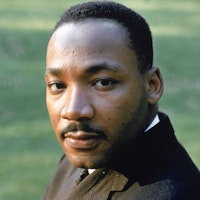Every man must decide whether he will walk in the light of creative altruism or the darkness of destructive selfishness. This is the judgment. Life’s most persistent and urgent question is, “What are you doing for others?”
Martin Luther King Jr.

Life’s Most Persistent and Urgent Question
Topic: Serving Others
“In a sense every day is judgment day, and we, through our deeds and words, our silence and speech, are constantly writing in the Book of Life.
Light has come into the world, and every man must decide whether he will walk in the light of creative altruism or the darkness of destructive selfishness. This is the judgment. Life’s most persistent and urgent question is, “What are you doing for others?””
Another Version of this Sermon [Many of Martin Luther King, Jr.’s speeches and sermons were delivered multiple times with slight variants]:
“An Individual has not started living fully until they can rise above the narrow confines of individualistic concerns to the broader concerns of humanity. Every person must decide at some point, whether they will walk in the light of creative altruism or in the darkness of destructive selfishness. This is the judgment: Life’s most persistent and urgent question is: ‘What are you doing for others?'”
–Dr. Martin Luther King, Jr. [As quoted in The Words of Martin Luther King, Jr. by Coretta Scott King, Second Edition (2011), Ch. “Community of Man”] p. 3.
Martin Luther King Jr. was born on January 15, 1929, in Atlanta, Georgia, as Michael Luther King Jr., but later changed his name to Martin. He came from a family of pastors, with his grandfather and father both serving as pastors at the Ebenezer Baptist Church. Martin Luther King Jr. attended segregated public schools and graduated from high school at the age of fifteen. He went on to earn his B.A. degree in 1948 from Morehouse College, where his father and grandfather had also graduated.
After completing three years of theological study at Crozer Theological Seminary, where he was elected president of a predominantly white senior class, King received his B.D. degree in 1951. He then pursued graduate studies at Boston University, where he met and married Coretta Scott. King completed his doctorate in 1955 and had two sons and two daughters with Coretta. Throughout his life, Martin Luther King Jr. played a crucial role in the civil rights movement, advocating for racial equality and justice through nonviolent means. His leadership and inspiring speeches, such as his famous "I Have a Dream" speech, made him a prominent figure in the fight against segregation and discrimination. In 1964, he was awarded the Nobel Peace Prize for his efforts to promote peaceful change and equality for African Americans. Tragically, Martin Luther King Jr. was assassinated on April 4, 1968, but his legacy as a champion of civil rights continues to inspire people around the world.
Strength To Love
Wilson, Andrew, editor. World Scripture II. Universal Peace Federation, 2011, p. 577 [Martin Luther King Jr., "Strength to Love” (1963), and “Three Dimensions of a Complete Life” sermon].

Martin Luther King Jr.
Resources
- Quote Investigator website: 'Life's Most Persistent and Urgent Question'
- The Wisdom of Dr. Martin Luther King, Jr., Faith Perspectives, Servant-Leader Associates Website
- The King Center website, 'Life's Most Persistent and Urgent Question'
- On Being with Krista Tippett, Ruby Sales Where Does It Hurt?
- Stanford The Martin Luther King, Jr. Research and Education Institute
- Never-before-released Recordings of Dr. King at the Riverside Church (1961-1967)
Copyright © 2017 – 2024 LuminaryQuotes.com About Us

Dr. Martin Luther King, Jr.
Dr. Martin Luther King, Jr. was born in 1929 and died tragically in 1968. In his brief 39 years with us he embodied the life of a prophet speaking to the often silent conscience of our country. He named evil, stood firmly against it and yet embraced a style of leadership which was both confrontational and non‐violent. No leader, in our time, has more faithfully embodied servant‐leadership.
–The Wisdom of Dr. Martin Luther King, Jr. [Faith Perspectives, Servant-Leader Associates].
Another Version of this Sermon (Many of MLKs’ speeches and sermons were delivered multiple times with slight variants)
“An Individual has not started living fully until they can rise above the narrow confines of individualistic concerns to the broader concerns of humanity. Every person must decide at some point, whether they will walk in light of creative altruism or in the darkness of destructive selfishness. This is the judgment: Life’s most persistent and urgent question is: ‘What are you doing for others?'”
–Dr. Martin Luther King, Jr. [As quoted in The Words of Martin Luther King, Jr. by Coretta Scott King, Second Edition (2011), Ch. “Community of Man”] p. 3.
Additional Martin Luther King, Jr. Quotes
“The time is always right to do what’s right.”
–Dr. Martin Luther King, Jr. [Speech delivered in Finney Chapel at Oberlin College (22 October 1964), as reported in “When MLK came to Oberlin” by Cindy Leise, The Chronicle-Telegram (21 January 2008)].
Nelson Mandela
“Let the strivings of us all, prove Martin Luther King Jr. to have been correct, when he said that humanity can no longer be tragically bound to the starless midnight of racism and war. Let the efforts of us all, prove that he was not a mere dreamer when he spoke of the beauty of genuine brotherhood and peace being more precious than diamonds or silver or gold. Let a new age dawn!”
–Nelson Mandela, at the end of his Nobel Peace Prize Acceptance Address (10 December 1993).